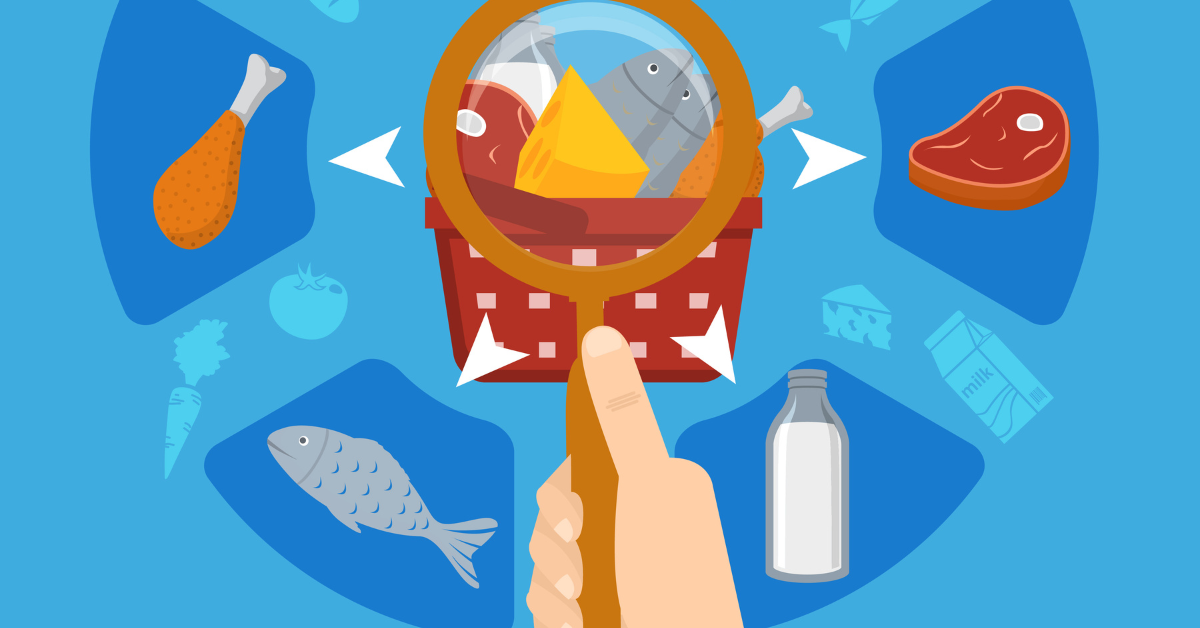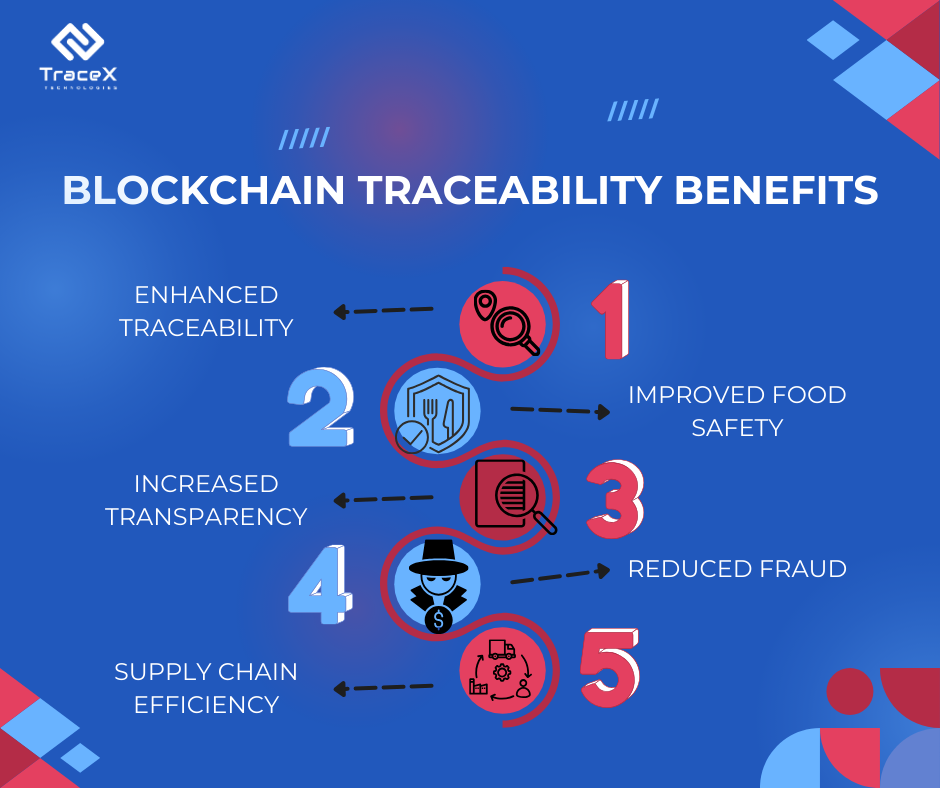Contact: +91 99725 24322 |
Menu
Menu
Quick summary: Explore the transformative potential of blockchain technology in revolutionizing food supply chains. Discover how blockchain enhances transparency, traceability, and trustworthiness throughout the entire food production and distribution process

Today transparency and trust are more crucial than ever, especially in food supply chains. With rising consumer demand for information about the origins of their food, companies face mounting pressure to provide clear and verifiable details about their products. Harnessing Blockchain for food supply chain can reshape the future by enhancing transparency and traceability throughout the entire food supply chain.
A recent report highlighted that up to 10% of food products in the market are estimated to be counterfeit or mislabeled, which can have serious implications for food safety and brand trust.
Many businesses grapple with issues like food fraud, spoilage, and inefficiencies, leading to financial losses and a tarnished reputation This is whereby leveraging blockchain, companies can not only mitigate risks but also build stronger relationships with their consumers, ensuring that every bite is backed by integrity and accountability.
Key Takeaways
Food supply chains play a crucial role in ensuring the efficient and timely delivery of food products from farm to table. These intricate networks encompass various stages, including production, processing, distribution, and retailing. From small-scale local farms to multinational corporations, each entity in the supply chain contributes to the overall flow of food products. With increasing consumer demands for transparency, sustainability, and food safety, supply chain management has become more complex than ever before. Technologies like blockchain are now being leveraged to enhance traceability, improve efficiency, and build trust among consumers. As the global population continues to grow and environmental challenges mount, the resilience and effectiveness of food supply chains are paramount in ensuring food security for all.
Blockchain technology operates by integrating sophisticated computational and cryptographic techniques within a decentralized data structure, facilitating the establishment of a digital trust system within an untrusted environment. At the core of blockchain lies the hash function, which generates unique identifiers using algorithmic methods for data authentication. To safeguard data integrity, the stored chain format incorporates inserted hash values, enabling verification for any modifications to the data. In transactions stored within the blockchain, data senders and receivers utilize digital signatures to validate their identities. Furthermore, the consensus mechanism involves all computer nodes, effectively mitigating the risks of data manipulation by minority attackers.
Blockchain technology offers transformative solutions for food supply chain management empowering stakeholders to create safer, more transparent, and sustainable food systems. By leveraging blockchain’s capabilities, the food industry can enhance efficiency, ensure quality, and build trust with consumers, ultimately improving the overall integrity of the global food supply chain.
Blockchain enables real-time visibility into every stage of the food supply chain, from farm to fork. Each transaction, such as the movement of raw materials, processing, packaging, and distribution, is recorded in a secure and immutable digital ledger. This supply chain transparency allows all participants to track the journey of food products, ensuring accountability and reducing the risk of fraud or contamination.
With blockchain, the provenance of food products can be traced back to their source with unprecedented accuracy. Each item is assigned a unique identifier, such as a QR code or RFID tag, which is recorded on the blockchain along with relevant information such as origin, production methods, and handling procedures. In the event of a food safety issue or recall, stakeholders can quickly identify affected products and take targeted action to mitigate risks.
Blockchain facilitates the monitoring and verification of food quality and safety standards throughout the supply chain. Smart contracts embedded in the blockchain can automate compliance checks, ensuring that products meet regulatory requirements and industry standards. This proactive approach to quality assurance helps prevent the distribution of contaminated or counterfeit goods, safeguarding consumer health and brand reputation.
By streamlining record-keeping processes and reducing manual paperwork, blockchain enhances operational efficiency and reduces administrative costs in agricultural and food supply chains. Smart contracts enable automated workflows, such as payment processing and contract fulfillment, leading to faster transactions and fewer errors. Additionally, the elimination of intermediaries and redundant data silos can result in significant cost savings for businesses.
Blockchain technology facilitates the monitoring and verification of sustainable sourcing practices throughout the food supply chain. By recording data such as origin, production methods, and environmental impact, blockchain enables stakeholders to ensure compliance with sustainability standards and certifications. This transparency promotes responsible sourcing practices, reduces environmental degradation, and supports the transition towards more sustainable agricultural practices.
A leading spice processor, renowned for its commitment to quality and sustainability, leveraged TraceX’s Sustainability Platform to revolutionize its spice supply chain. Operating across Karnataka, India, as well as Vietnam and Turkey, the processor utilized TraceX’s blockchain-powered solution to enhance transparency, ensure product authenticity, and guarantee safety. By digitizing their operations, they achieved end-to-end traceability, ensuring that every step of the spice journey—from sourcing to processing—met the highest sustainability standards. This platform allowed them to manage supplier compliance, monitor quality control, and build trust with consumers by showcasing their dedication to ethical sourcing and food safety.
Blockchain instills confidence and trust among consumers by providing transparent and verifiable information about the products they consume. By scanning a QR code or accessing a blockchain-enabled platform, consumers can access detailed data about the origin, production methods, and sustainability credentials of food products. This increased transparency builds trust and loyalty, driving demand for ethically sourced and responsibly produced food.

The TraceX food traceability platform is a blockchain-powered solution that ensures complete transparency, accuracy, and trust in the food supply chain. By leveraging blockchain technology, TraceX creates an immutable, decentralized ledger that records every step of the food production and supply process, from farm to fork.
1. End-to-End Traceability: TraceX tracks products through every stage, including production, processing, packaging, and distribution. This helps ensure that stakeholders can trace the origin of the food at any point in the supply chain, preventing fraud and contamination.
2. Blockchain Integration: The blockchain technology behind the platform ensures that all recorded data is tamper-proof, providing high security and trust. This transparency is particularly crucial for companies seeking to comply with regulatory requirements like EUDR (European Union Deforestation Regulation) or sustainability initiatives.
3. Real-Time Data Monitoring: The platform provides real-time visibility into the supply chain. Whether it’s monitoring the conditions in which crops are grown, or the transportation environment for perishable goods, TraceX offers instant insights, reducing inefficiencies and risks.
4. Compliance and Reporting: TraceX helps companies meet global food safety and sustainability regulations by offering automated compliance reports and data analytics. This is critical for businesses to meet consumer demands and maintain product quality standards.
In conclusion, the integration of blockchain technology into food supply chains holds immense potential to revolutionize the way we produce, distribute, and consume food. By providing transparent and immutable records of transactions, blockchain ensures food safety, traceability, and authenticity. This not only enhances consumer trust but also promotes sustainability and ethical practices throughout the supply chain. As we continue to harness the power of blockchain technology, we pave the way for a future where food supply chains are more resilient, transparent, and equitable for all stakeholders involved.
